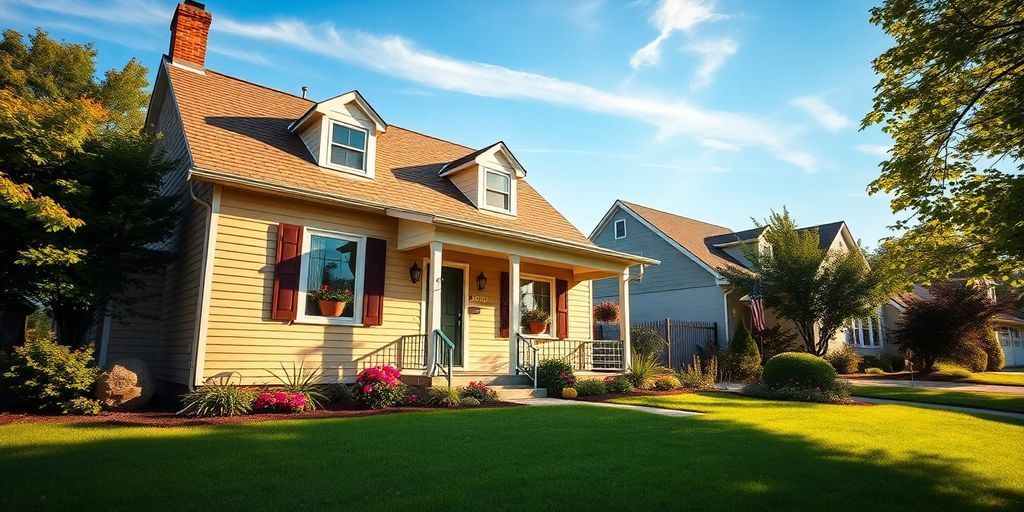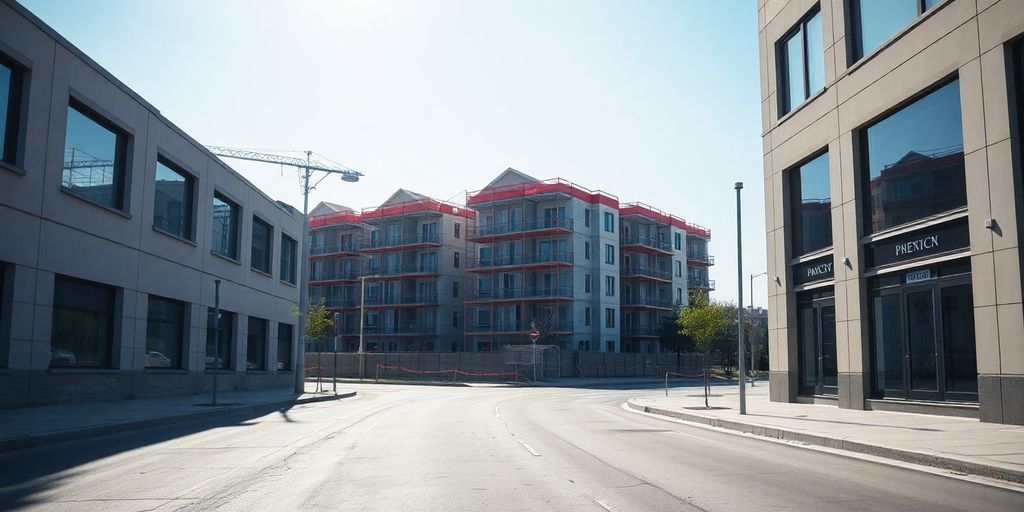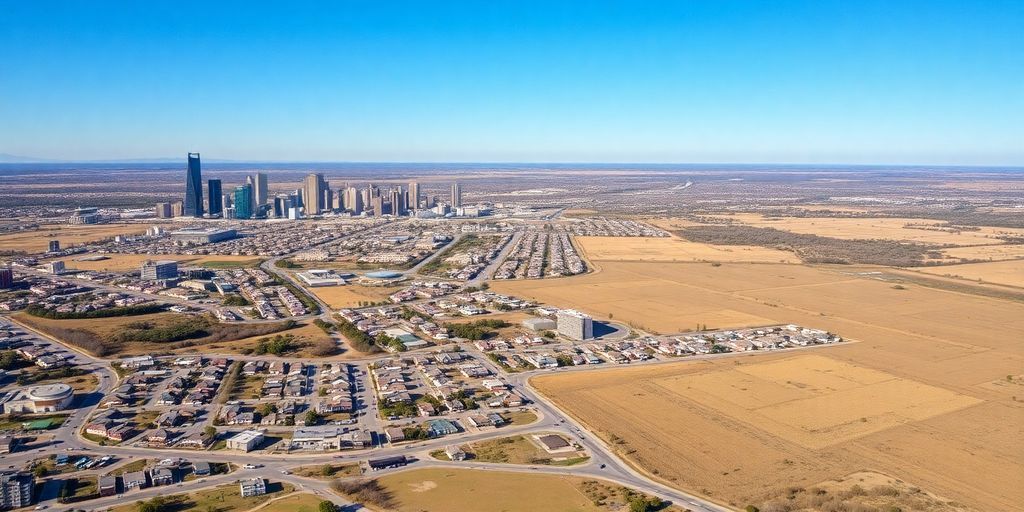The Southeast Surge: Real Estate Investment Trends You Need to Know
Blog Author - Published Date
The Southeast has become a really popular spot for people and businesses lately. This means real estate here is doing great, like, one of the best in the country. It's not just the big cities either; smaller towns are seeing a lot of action too. We're talking about apartments, stores, and industrial buildings all getting tons of investment. This article will tell you about some of these up-and-coming spots in the Southeast and what kind of investment chances you can find.
Key Takeaways
- Real estate investing is basically buying property and then either selling it or renting it out to make money.
- Not every state is the same when it comes to real estate investment opportunities; some are better than others.
- Things like how much homes cost, how many people are moving there, job growth, taxes, and empty properties all play a part in whether a state is good for investing.
- The Southeast is seeing a lot of growth, making it a hot area for real estate investments right now.
- Looking at smaller, secondary cities can sometimes reveal hidden gems for investors, not just the well-known big places.
Emerging Markets in Southeast Real Estate Investment
The Southeast is booming, and it's not just the usual suspects like Atlanta and Miami seeing all the action. Savvy investors are starting to look at smaller cities with big potential. These emerging markets offer unique opportunities for growth and higher returns. It's all about finding those hidden gems before everyone else does.
Knoxville's Industrial Sector Growth
Knoxville, Tennessee, is making waves, especially in the industrial sector. The city's industrial vacancy rate is incredibly low, hovering around 0.9%, which is among the lowest in the Southeast. This tight market is driven by consistent demand and a limited supply of new construction. Manufacturing and local distribution are major players, creating a solid foundation for continued growth. If you're looking for investment opportunities in industrial real estate, Knoxville should definitely be on your radar.
Savannah's Port-Driven Economic Boom
Savannah, Georgia, is experiencing an economic boom fueled by its bustling port. The Port of Savannah is one of the fastest-growing ports in the nation, bringing jobs and investment to the region. This growth is driving demand for housing, retail, and industrial space. The multifamily sector is expanding, and vacancy rates are below the historical average. Coastal living is a big draw, and new luxury apartment complexes are popping up to meet the demand. It's a great time to consider Savannah's diverse real estate landscape.
Secondary Cities Driving Investment Activity
Beyond Knoxville and Savannah, other secondary cities in the Southeast are also attracting attention. These cities offer a mix of affordability, growth potential, and stable markets.
- Greenville, South Carolina: A growing economy and attractive rental yields make Greenville a compelling option.
- Birmingham, Alabama: Affordable property prices and steady rental demand are key features of Birmingham's market.
- Little Rock, Arkansas: Investors seeking high cash flow in a stable market should consider Little Rock.
Investing in these secondary markets requires careful research and a solid understanding of local market dynamics. However, the potential rewards can be significant for those willing to look beyond the major metropolitan areas.
These smaller cities are proving that the Southeast's growth is widespread, offering diverse opportunities for real estate investors.
Key Factors for Southeast Real Estate Investment
Population and Job Growth Trends
Population shifts and job creation are huge for real estate. The Southeast has seen a lot of both lately. More people moving in means more demand for housing, which can drive up property values and rental rates. Job growth, especially in growing sectors, gives people the financial stability to buy or rent, further fueling the market. Keep an eye on these trends to spot areas with the most ROI potential.
Affordability and Property Values
Compared to other parts of the country, the Southeast still offers relatively affordable property. This lower barrier to entry makes it attractive to investors. But, it's not just about the initial price. You also need to consider property taxes, insurance costs, and potential maintenance expenses. Finding that sweet spot where property values are reasonable but have room to grow is key.
Vacancy Rates and Rental Demand
Vacancy rates tell you how many properties are sitting empty. Low vacancy rates usually mean high rental demand, which is good news for landlords. High demand allows you to be more selective with tenants and potentially charge higher rents. Look for areas with a good balance of supply and demand to maximize your rental income.
It's important to remember that real estate is local. National trends are interesting, but what really matters is what's happening on the ground in the specific market you're considering. Do your homework, talk to local experts, and don't be afraid to walk away if something doesn't feel right.
Investment Opportunities in Georgia's Real Estate
Strong Economic Indicators in Georgia
Georgia is looking like a solid place for real estate investment. The economy is doing well, and the real estate market seems promising for investors. The state's economy is diverse, with key sectors like logistics, manufacturing, and tourism contributing significantly to its growth. Georgia's GDP was at $714 billion in 2022, showing a strong economic base. This kind of economic activity can really help the real estate market.
Affordable Living and Property Appreciation
One of the things that makes Georgia attractive is how affordable it is. The cost of living is about 9% lower than the national average, which is a big deal for both residents and investors. Property values have been going up too, with an annual home price appreciation of 4.6% in the second quarter of 2023. Plus, the average property tax rate is relatively low, which is good news for investors.
Rental Market Dynamics in Georgia
Georgia's rental market has its own set of dynamics. While the rental vacancy rate was around 8.2% in late 2023, the state's strong economy suggests there's potential for long-term gains. The rental market is influenced by factors like job growth and population increases. Here are some things to keep in mind:
- Job growth is happening at a rate of 2.2%.
- Population growth is around 1.1%.
- These factors can drive demand for rental properties.
Investing in real estate always comes with risks, so it's important to do your homework and understand the local market conditions. Things can change quickly, so staying informed is key.
Here's a quick look at some key stats:
| Metric | Value |
|---|---|
| Typical Home Value (Dec 2023) | $316,000 |
| Median Household Income | $68,000 |
| Cost of Living Index (2024) | 91.00 |
Savannah's Diverse Real Estate Landscape
Savannah's real estate market is booming, fueled by tourism, manufacturing, and the ever-expanding Port of Savannah. It's not just one thing driving growth; it's a mix of factors that make it an interesting place for investors. Let's take a look at the different facets of this coastal city's real estate scene.
Coastal Living and Multifamily Expansion
Savannah's coastal charm is a major draw, and that's reflected in the demand for multifamily properties. The increased desire for coastal living has helped Savannah’s multifamily sector expand in interest and profitability. Asking rents have seen significant increases. Development is really taking off in suburban areas like Port Wentworth and Southwest Savannah. It's worth keeping an eye on these areas as they continue to grow.
Industrial and Retail Sector Performance
The industrial sector in Savannah is seeing historic numbers, driven by the Port of Savannah. Vacancy rates are low, and a lot of money has changed hands in the past year. Logistic firms are taking up most of the leasing activity. The retail sector had some struggles, but it's showing promise now. Rent growth is above the city's historical average, and out-of-state buyers are making deals. The strongest and most in-demand retail property types include free-standing net lease assets.
Steady Appreciation and Property Options
Savannah offers a range of property types, from historic homes to new developments. This variety caters to different investment strategies and tenant preferences. While offering cash flow potential, Savannah’s real estate market is also experiencing steady home price appreciation driven by population growth and economic factors.
Savannah's real estate market is a blend of historic charm and modern growth. The city's diverse economy and increasing population create a unique environment for investors looking for both stability and opportunity.
High Cash Flow Markets in the Southeast
Real estate investors often look to the Southeast for opportunities to generate strong cash flow. Several cities in this region stand out due to their affordable property prices, growing economies, and robust rental markets. Let's explore some of these high cash flow markets.
Birmingham's Affordable Properties
Birmingham, Alabama, is gaining attention for its affordable real estate. This makes it easier for investors to achieve positive cash flow from rental properties. The lower entry cost allows for higher rental yields compared to more expensive markets. The city's steady rental demand, supported by a diverse economy, contributes to its appeal as a cash flow market. Investors can find opportunities in single-family homes, duplexes, and small apartment buildings.
Greenville's Growing Economy
Greenville, South Carolina, is experiencing significant economic growth areas, making it an attractive destination for real estate investment. The city's expanding job market, particularly in manufacturing and healthcare, is driving demand for housing. This increased demand translates to attractive rental yields for investors. Greenville's downtown revitalization and quality of life improvements are also contributing to its appeal. The city offers a mix of property types, from historic homes to new developments, providing options for various investment strategies.
Little Rock's Stable Market
Little Rock, Arkansas, presents a stable real estate market with opportunities for investors seeking consistent cash flow. While not as high-growth as some other Southeast cities, Little Rock offers a reliable rental market with steady demand. The city's market drivers, including government and healthcare sectors, provide a solid foundation for the local economy. Investors can find affordable properties in various neighborhoods, offering the potential for positive cash flow. Little Rock's lower cost of living and relatively stable property values make it a less volatile option for real estate investment.
Investing in real estate always carries risk. Thorough research and due diligence are essential before making any investment decisions. Consider factors such as property taxes, insurance costs, and potential maintenance expenses when evaluating cash flow potential.
Understanding Real Estate Investment in the Southeast
Real estate investment can seem complicated, but it's really about understanding the different ways you can make money from property. It's not just about buying a house; it's about creating wealth. Let's break down some key concepts.
Defining Real Estate Investment Strategies
There are several paths you can take when investing in real estate. You could buy a property to rent it out, aiming for consistent monthly income. Or, you might focus on flipping houses, buying properties that need work, fixing them up, and then selling them for a profit. Another option is to invest in commercial real estate, like office buildings or retail spaces. Each strategy has its own set of risks and rewards, so it's important to choose one that aligns with your financial goals and risk tolerance. Understanding the different investment strategies is the first step.
Flipping Versus Rental Income Generation
Flipping and renting are two very different approaches. Flipping requires a good eye for potential, renovation skills (or the ability to hire reliable contractors), and a solid understanding of the local market. The goal is to quickly increase the property's value and sell it for a profit. Rental income, on the other hand, is a longer-term strategy. You're aiming to generate a steady stream of income from rent payments. This requires managing tenants, maintaining the property, and dealing with vacancies. Both can be profitable, but they demand different skill sets and time commitments. Here's a quick comparison:
| Feature | Flipping | Rental Income |
|---|---|---|
| Timeframe | Short-term | Long-term |
| Income | One-time profit | Recurring monthly income |
| Risk | Market fluctuations, renovation costs | Vacancy, maintenance costs, tenant issues |
| Skills Required | Renovation, market analysis | Property management, tenant relations |
The Role of Real Estate Investment Trusts
If you're not ready to directly buy and manage properties, you can still invest in real estate through Real Estate Investment Trusts (REITs). REITs are companies that own and operate income-producing real estate, such as apartments, office buildings, and shopping centers. When you buy shares of a REIT, you're essentially investing in a portfolio of properties. REITs are required to distribute a certain percentage of their income to shareholders, making them an attractive option for investors seeking dividend income. They also offer diversification and liquidity, as you can easily buy and sell shares on the stock market.
Real estate investment trusts offer a way to participate in the real estate market without the responsibilities of direct property ownership. They can be a good option for those looking for passive income and diversification in their investment portfolio.
Strategic Planning for Southeast Real Estate Investment
Investing in the Southeast's real estate market can be rewarding, but it requires careful planning. Jumping in without a strategy is a recipe for disaster. Let's break down some key areas to focus on.
Thorough Research and Market Dynamics
Before you even think about buying a property, you need to do your homework. Don't just rely on surface-level information. Dig deep into the local market dynamics. What are the major industries? What's the job growth like? What are the population trends? Understanding these factors will help you make informed decisions. Look at top states for purchasing rental property to get a sense of where the opportunities are.
Evaluating Property Management Options
Are you planning to manage the property yourself, or will you hire a property manager? Both options have pros and cons. Self-managing can save you money, but it also requires a significant time commitment. Hiring a property manager frees up your time, but it also eats into your profits. Consider your lifestyle and resources when making this decision.
Staying Informed on Regulations and Risks
Real estate investing comes with its share of risks. Interest rate fluctuations, property damage, and tenant issues are just a few things that can impact your bottom line. A comprehensive risk assessment is crucial before making any investment decisions. You also need to stay up-to-date on local regulations and laws. These can change frequently and can significantly impact your investment.
It's important to remember that real estate is a long-term game. Don't expect to get rich overnight. Be patient, do your research, and stay informed, and you'll be well on your way to success.
Here's a quick checklist to keep in mind:
- Conduct thorough market research.
- Develop a detailed financial plan.
- Understand local regulations.
- Evaluate property management options.
- Prepare for potential risks.
Wrapping It Up: Your Southeast Real Estate Journey
So, there you have it. The Southeast is definitely a hot spot for real estate right now. We've talked about how much it's grown and why so many people are moving there. It's not just the big, famous cities either; those smaller towns are really starting to shine. Finding good deals means looking a bit harder, maybe in places you hadn't thought of before. But if you do your homework and pick smart, there's a lot of opportunity to make some money in this region. It's all about being ready to explore and see what's out there.
Frequently Asked Questions
What exactly is real estate investment?
Real estate investment means buying properties like houses or buildings to sell or rent them out for money. You could fix up an old house and sell it for more (called 'flipping'), or you could rent out a property to get a steady income.
Why is the Southeast good for real estate investing?
The Southeast is a great place to invest because lots of people are moving there, and new jobs are popping up. This means more people need homes, which drives up property values and rental demand. Plus, some areas are still pretty affordable.
What makes a place a good spot for real estate investment?
When looking for a good investment spot, check things like how fast the population is growing, how many new jobs are being created, how much homes cost, and how many rental properties are empty. Low property taxes and a strong local economy are also good signs.
Are there specific cities in the Southeast that are especially good for investing right now?
Yes, places like Knoxville, Tennessee, and Savannah, Georgia, are seeing big growth. Knoxville's factories and warehouses are booming, while Savannah's port is making it a busy hub for trade and new businesses. These cities offer lots of chances for investors.
What's the difference between 'flipping' a house and getting 'rental income'?
Flipping means buying a property, fixing it up, and selling it quickly for a profit. Getting rental income means buying a property and renting it out to tenants over time. Both can make you money, but they have different risks and rewards.
What should I do before I jump into real estate investing in the Southeast?
Before you invest, do your homework! Look into the local market trends, figure out if you'll manage the property yourself or hire someone, and stay updated on any new rules or potential risks. Having a clear plan is key to success.














